- Home
- Sarah Dessen
Just Listen Page 2
Just Listen Read online
Page 2
“Hold on.” Now my father was paying attention. “There’s a stalker at the pool?”
“I hope not,” my mother said, in her worried voice.
“She’s not a stalker, really,” Kirsten said. “She’s just this girl who’s been hanging around us. It’s so creepy. She, like, sits beside us, and follows us around, and doesn’t talk, and she’s always listening to what we’re saying. I’ve told her to get lost, but she just ignores me. God! I can’t believe she’s only twelve. That makes it even sicker.”
“So dramatic,” Whitney muttered, spearing a piece of lettuce with her fork.
She was right, of course. Kirsten was our resident drama queen. Her emotions were always at full throttle, as was her mouth; she never stopped talking, even if she was well aware you weren’t listening to her. In contrast, Whitney was the silent type, which meant the few words she uttered always carried that much more meaning.
“Kirsten,” my mother said now, “be nice.”
“Mom, I’ve tried that. But if you saw her, you’d understand. It’s strange.”
My mother took a sip of her wine. “Moving to a new place is difficult, you know. Maybe she doesn’t know how to make friends—”
“She obviously doesn’t,” Kirsten told her.
“—which means that it might be your job to meet her halfway,” my mother finished.
“She’s twelve,” Kirsten said, as if this was on par with being diseased, or on fire.
“So is your sister,” my father pointed out.
Kirsten picked up her fork and pointed it at him. “Exactly,” she said.
Beside me, Whitney snorted. But my mom, of course, was already turning her attention on me. “Well, Annabel,” she said, “maybe you could make an effort, if you do see her. To say hello or something.”
I didn’t tell my mother I’d already met this new girl, mostly because she would have been horrified she’d been so rude to me. Not that this would have changed her expectations for my behavior. My mother was famously polite, and expected the same of us, regardless of the circumstances. Our whole lives were supposed to be the high road. “Okay,” I said. “Maybe I will.”
“Good girl,” she said. And that, I hoped, was that.
The next afternoon, though, when Clarke and I got to the pool, Kirsten was already there, lying out with Molly on one side and the new girl on the other. I tried to ignore this as we got settled in our spot, but eventually I glanced over to see Kirsten watching me. When she got up a moment later, shooting me a look, then headed toward the snack bar, the new girl immediately following her, I knew what I had to do.
“I’ll back in a second,” I told Clarke, who was reading a Stephen King novel and blowing her nose.
“Okay,” she said.
I got up, then started around by the high dive, crossing my arms over my chest as I passed Chris Pennington. He was lying on a beach chair, a towel over his eyes, while a couple of his buddies wrestled on the pool deck. Now, instead of sneaking glances at him—which, other than swimming and getting beaten at cards, was my main activity at the pool that summer—I’d get bitched out again, all because my mother was insistent we be raised as the best of Good Samaritans. Great.
I could have told Kirsten about my previous run-in with this girl, but I knew better. Unlike me, she did not shy away from confrontation—if anything, she sped toward it, before overtaking it completely. She was the family powder keg, and I had lost track of the number of times I’d stood off to the side, cringing and blushing, while she made her various displeasures clear to salespeople, other drivers, or various ex-boyfriends. I loved her, but the truth was, she made me nervous.
Whitney, in contrast, was a silent fumer. She’d never tell you when she was mad. You just knew, by the expression on her face, the steely narrowing of her eyes, the heavy, enunciated sighs that could be so belittling that words, any words, seemed preferable to them. When she and Kirsten fought—which, with two years between them, was fairly often—it always seemed at first like a one-sided argument, since all you could hear was Kirsten endlessly listing accusations and slights. Pay more attention, though, and you’d notice Whitney’s stony, heavy silences, as well as the rebuttals she offered, few as they were, that always cut to the point much more harshly than Kirsten’s swirling, whirly commentaries.
One open, one closed. It was no wonder that the first image that came to mind when I thought of either of my sisters was a door. With Kirsten, it was the front one to our house, through which she was always coming in or out, usually in mid-sentence, a gaggle of friends trailing behind her. Whitney’s was the one to her bedroom, which she preferred to keep shut between her and the rest of us, always.
As for me, I fell somewhere between my sisters and their strong personalities, the very personification of the vast gray area that separated them. I was not bold and outspoken, or silent and calculating. I had no idea how anyone would describe me, or what would come to mind at the sound of my name. I was just Annabel.
My mother, conflict-adverse herself, hated it when my sisters fought. “Why can’t you just be nice?” she’d plead with them. They might have rolled their eyes, but a message sank in with me: that being nice was the ideal, the one place where people didn’t get loud or so quiet they could scare you. If you could just be nice, then you wouldn’t have to worry about arguments at all. But being nice wasn’t as easy as it seemed, especially when the rest of the world could be so mean.
By the time I got to the snack bar, Kirsten had disappeared (of course), but the girl was still there, waiting for the guy behind the counter to ring up her candy bar. Oh well, I thought, as I walked up to her. Here goes nothing.
“Hi,” I said. She just looked at me, her expression unreadable. “Um, I’m Annabel. You just moved here, right?”
She didn’t say anything for what seemed like a really long while, during which time Kirsten walked out of the ladies’ room behind her. She stopped when she saw us talking.
“I,” I continued, now even more uncomfortable, “I, um, think we’re in the same grade.”
The girl reached up, pushing her sunglasses farther up her nose. “So?” she said, in that same sharp, snide voice as the first time she’d addressed me.
“I just thought,” I said, “that since, you know, we’re the same age, you might want to hang out. Or something.”
Another pause. Then the girl said, as if clarifying, “You want me to hang out. With you.”
She made it sound so ridiculous I immediately began backtracking. “I mean, you don’t have to,” I told her. “It was just—”
“No,” she cut me off flatly. Then she tilted her head back and laughed. “No way.”
The thing is, if it had just been me there, that would have been it. I would have turned around, face flushed, and gone back to Clarke, game over. But it wasn’t just me.
“Hold on,” Kirsten said, her voice loud. “What did you just say?”
The girl turned around. When she saw my sister, her eyes widened. “What?” she said, and I couldn’t help but notice how different this, the first word she’d ever said to me, sounded as she said it now.
“I said,” Kirsten repeated, her own voice sharp, “what did you just say to her?”
Uh-oh, I thought.
“Nothing,” the girl replied. “I just—”
“That’s my sister,” Kirsten said, pointing at me, “and you were just a total bitch to her.”
By this point, I was already both cringing and blushing. Kirsten, however, put her hand on her hip, which meant she was just getting started.
“I wasn’t a bitch,” the girl said, taking off her sunglasses. “I only—”
“You were, and you know it,” Kirsten said, cutting her off. “So you can stop denying it. And stop following me around, too, okay? You’re creeping me out. Come on, Annabel.”
I was frozen to the spot, just looking at the girl’s face. Without her sunglasses, her expression stricken, she suddenly looked twelve, just stari
ng at us as Kirsten grabbed my wrist, tugging me back to where she and her friends were sitting.
“Unbelievable,” she kept saying, and as I looked across the pool I could see Clarke watching me, confused, as Kirsten pulled me down onto her chair. Molly sat up, blinking, reaching up to catch the untied straps of her bikini.
“What happened?” she asked, and as Kirsten began to tell her, I glanced back toward the snack bar, but the girl was gone. Then I saw her, through the fence behind me, walking across the parking lot, barefoot, her head ducked down. She’d left all her stuff on the chair beside me—a towel, her shoes, a bag with a magazine and billfold, a pink hairbrush. I kept waiting for her to realize this and turn back for it. She didn’t.
Her things stayed there all afternoon: After I’d gone back to sit with Clarke, and told her everything. After we played several hands of rummy, and swam until our fingers were pruny. After Kirsten and Molly left, and other people took their chairs. All the way up until the lifeguard finally blew the whistle, announcing closing time, and Clarke and I packed up and walked around the edge of the pool, sunburned and hungry and ready to go home.
I knew this girl was not my problem. She’d been mean to me, twice, and therefore was not deserving of my pity or help. But as we passed the chair, Clarke stopped. “We can’t just leave it,” she said, bending over to gather up the shoes and stuff them into the bag. “And it’s on our way home.”
I could have argued the point, but then I thought again of her walking across the parking lot, barefoot, alone. So I pulled the towel off the chair, folding it over my own. “Yeah,” I said. “Okay.”
Still, when we got to the Daughtrys’ old house, I was relieved to see all the windows were dark and there was no car in the driveway, so we could just leave the girl’s stuff and be done with it. But as Clarke bent down to stick the bag against the front door, it opened, and there she was.
She had on cutoff shorts and a red T-shirt, her hair pulled back in a ponytail. No sunglasses. No high-heeled sandals. When she saw us, her face flushed.
“Hi,” Clarke said, after a just-long-enough-to-be-noticed awkward silence. Then she sneezed before adding, “We brought your stuff.”
The girl just looked at her for a second, as if she didn’t understand what she was saying. Which, with Clarke’s congestion, she probably didn’t. I leaned over and picked up the bag, holding it out to her. “You left this,” I said.
She looked at the bag, then up at me, her expression guarded. “Oh,” she said, reaching for it. “Thanks.”
Behind us, a bunch of kids coasted past on their bikes, their voices loud as they called out to one another. Then it was quiet again.
“Honey?” I heard a voice call out from the end of the dark hallway behind her. “Is someone there?”
“It’s okay,” she said over her shoulder. Then she stepped forward, shutting the door behind her, and came out onto the porch. She quickly moved past us, but not before I saw that her eyes were red and swollen—she’d been crying. And suddenly, like so many other times, I heard my mother’s voice in my head: Moving to a new place is tough. Maybe she doesn’t know how to make friends.
“Look,” I said, “about what happened. My sister—”
“It’s fine,” she said, cutting me off. “I’m fine.” But as she said it, her voice cracked, just slightly, and she turned her back to us, putting a hand to her mouth. I just stood there, totally unsure what to do, but as I looked at Clarke, I saw she was already digging into the pocket of her shorts to pull out her ever-present pack of Kleenex. She drew one out, then reached around the girl, offering it to her. A second later, the girl took it, silently, and pressed it to her face.
“I’m Clarke,” Clarke said. “And this is Annabel.”
In the years to come, it would be this moment that I always came back to. Me and Clarke, in the summer after our sixth-grade year, standing there behind that girl’s turned back. So much might have been different for me, for all of us, if something else had happened right then. At the time, though, it was like so many other moments, fleeting and unimportant, as she turned around, now not crying—surprisingly composed, actually—to face us.
“Hi,” she said. “I’m Sophie.”
Chapter TWO
“Sophie!”
Finally it was lunchtime, which meant that this, the first day of school, was now at least half over. All around me, the hallway was packed and noisy, but even with locker doors clanging and the droning of various announcements from the intercom, I could still hear Emily Shuster’s voice, clear as day.
I looked down the hall to the main staircase and sure enough, she was coming toward me, her red head bobbing through the crowd. When she finally emerged about two feet from where I was standing, our eyes met, but only fleetingly. Then she was quickly moving on, down the hall to where Sophie was waiting for her.
Since Emily had been my friend first, I’d thought maybe, just maybe, she might still be. Apparently not. The lines had been drawn, and now I knew for sure I was standing outside of them.
I had other friends, of course. People I knew from my classes, and from the Lakeview Models, which I’d been doing for years now. It was becoming clear, though, that my self-imposed isolation during the summer had been more effective than I’d realized. Right after everything happened, I’d cut myself off entirely, figuring this was safer than risking people judging me. I blew off phone calls and avoided people when I saw them out at the mall or the movies. I didn’t want to talk about what had happened, so it seemed safest not to talk at all. The result, however, was that now all morning, when I’d stopped to say hello to girls I knew, or walked up to groups of people chatting, I’d felt an instant coolness and distance, one that lingered until I made my excuses and walked away. Back in May, all I’d I wanted was to be alone. Now I’d gotten my wish.
My association with Sophie didn’t help, of course. Hanging out with her made me a party to all her various social crimes and misdemeanors—and there were many—so there was a wide portion of the student body that was not exactly rushing to embrace me. To the girls Sophie had insulted and isolated while I stood by doing nothing, my own taste of this medicine was nothing short of deserved. If Sophie couldn’t be ostracized, I was the next best thing.
Now I headed down to the main lobby, stopping in front of the long row of glass doors that looked out over the courtyard. Outside, the various cliques—jocks, art girls, pols, burnouts—were scattered across the grassy spaces and walkways. Everyone had a place, and once I’d known mine: the long wooden bench to the right of the main walkway, where Sophie and Emily were sitting. Now I was wondering if I should even go out at all.
“It’s that time of year again,” someone called out in a falsetto voice from behind me. There was a burst of laughter, and as I turned around, I saw a group of football players hanging out by the front office. A tall guy with dreadlocks was imitating the way I’d held out my arm to that guy in the commercial, while the rest of them snickered. I knew they were just goofing around, and maybe another time it wouldn’t have bothered me. But now, I felt my face flush as I pushed the doors open in front of me and stepped outside.
There was a long wall to my right, so I headed toward it, looking for a spot, any spot, to sit down. There were only two people sitting on it, the distance between them just big enough to make it clear they weren’t together. One was Clarke Reynolds. The other was Owen Armstrong. It wasn’t like I had a lot of choices of seating or company, so I sat down between them.
The bricks were warm on my bare legs as I busied myself pulling out the lunch my mother had packed for me that morning: open-faced turkey sandwich, bottled water, and a nectarine. I uncapped the water, taking a big sip, before I finally allowed myself to take a look around. As soon as I glanced over at the bench, I saw Sophie was watching me. When our eyes met, she smiled a thin-lipped smile, shaking her head before looking away.
Pathetic, I heard her say in my head, then pushed this thought away. It wasn’t li
ke I wanted to sit with her, either. Then again, I never would have expected to find myself in my current company, either, with Clarke on one side and the Angriest Boy in School on the other.
At least Clarke I knew, or had once known. All the information I possessed about Owen Armstrong I’d gotten from a distance. Like that he was tall and muscular, with broad shoulders and thick biceps. And he always wore boots with thick rubber soles that made him seem even bigger, his steps heavier. His hair was dark and cut short, spiking up a bit at the top, and I’d never once seen him without his iPod and earphones, which he wore inside, outside, in class, out of class. And while I knew he had to have friends, I’d never seen him talk to anyone.
Then there was the fight. It had happened the previous January, in the parking lot before first bell. I’d just gotten out of my car when I saw Owen, backpack over his shoulder, earphones on as always, heading down to the main building. On the way, he passed Ronnie Waterman, who was leaning up against his car, talking with a bunch of his buddies. Every school has someone like Ronnie—a total jerk, famous for tripping people in the hallways, the kind of guy who yells “Nice ass!” when you walk past him. His older brother, Luke, had been his total opposite, captain of the football team and student body president, totally nice and well liked, and because of this, people put up with his annoying little brother. But Luke had graduated the year before, and now Ronnie was on his own.
Owen was just walking along, minding his own business, and Ronnie shouted out something to him. When he didn’t respond, Ronnie pushed off his car and crossed over to block Owen’s path. Even from where I was standing, I could tell this was a bad idea; Ronnie wasn’t small, but he was tiny compared to Owen Armstrong, who was a full head taller at least, not to mention much wider. Ronnie, however, didn’t seem to notice this. He said something else to Owen, and Owen just looked at him for a second, then stepped around him. As he started walking again, Ronnie hit him in the chin.

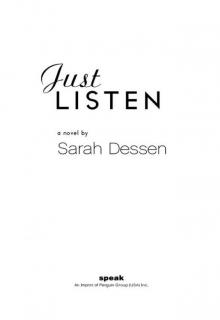 Just Listen
Just Listen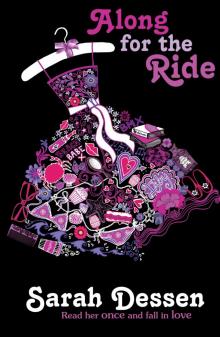 Along for the Ride
Along for the Ride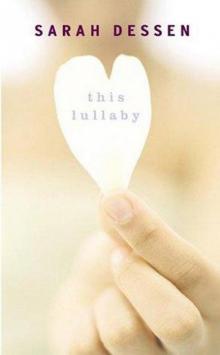 This Lullaby
This Lullaby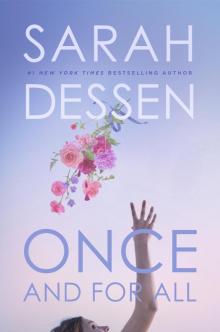 Once and for All
Once and for All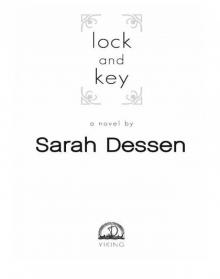 Lock and Key
Lock and Key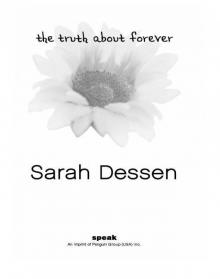 The Truth About Forever
The Truth About Forever Someone Like You
Someone Like You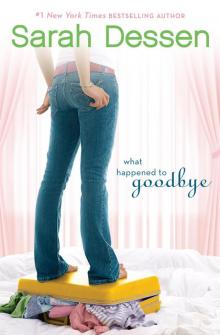 What Happened to Goodbye
What Happened to Goodbye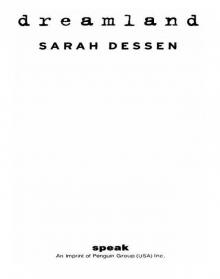 Dreamland
Dreamland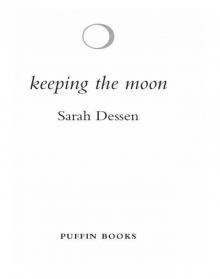 Keeping the Moon
Keeping the Moon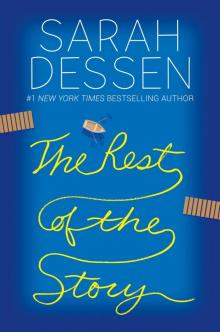 The Rest of the Story
The Rest of the Story The Moon and More
The Moon and More What Happens to Goodbye
What Happens to Goodbye